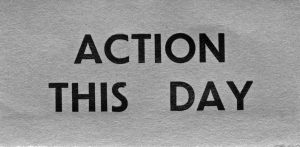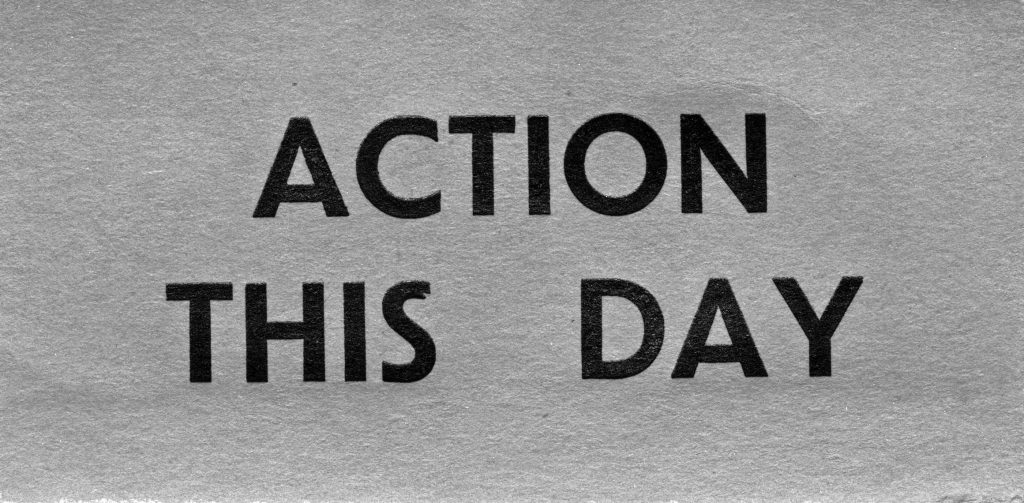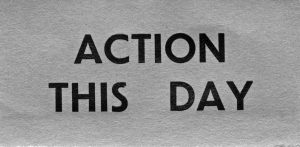
Finest Hour 177
Action This Day

December 19, 2017
Finest Hour 177, Summer 2017
Page 47
By Michael McMenamin
125 Years ago
Summer 1892 • Age 17
“I Shall Think about Putting Him in Business”
Throughout his long life, Winston was often his own worst enemy. It began at an early age. The summer of 1892 for Winston is best known for his first failure to pass the entrance exams to Sandhurst. Yet on 30 June, the day after he finished the exams, he wrote a characteristically optimistic letter to his father (“I did very well”) about the marks he believed he had achieved in the exams on the last day.
In the event, success eluded him. The total points for all eight subjects were 12,000, and the minimum passing score was 6457 or roughly 54%. Winston’s score was 5100 or 42.5%. He fell below a passing mark on six of the eight exams. The only two subjects in which he was above the average were French (1218 of 2000 or 61%) and English Composition (305 of 500 or 61%). Out of 693 candidates, only the top ninety passed the exams. Winston placed 390th.
It is not surprising, therefore, that his father wrote to Winston’s grandmother, the Duchess of Marlborough, in early September that “I don’t think Winston did particularly well in the army examination….His next try is on Nov 24th. If he fails again I shall think about putting him in business….”
100 Years ago
Summer 1917 • Age 42
“The Unsinkable Politician”
All prominent Conservative Party members in Lloyd George’s coalition government strongly opposed bringing Churchill back into the Cabinet in any position. But brought back he was. When given his choice by Lloyd George, Churchill chose the Ministry of Munitions. The Prime Minister’s private secretary (and later, in 1943, his wife) Frances Stevenson offered an explanation to her diary:

2024 International Churchill Conference
He says he wants someone who will cheer him up and help & encourage him & who will not be continually coming to him with a long face and telling him everything is going wrong. At present, he says he has to carry the whole of his colleagues on his back.
At the same time he announced Churchill’s appointment, Lloyd George also appointed Edward Montague as Secretary of State for India. This prompted the Conservative Lord Derby to observe in a letter a different reason for Churchill’s appointment, namely that Lloyd George was simply protecting his flanks against a renewed assault from Asquith, whom he had replaced as Prime Minister: “There is no doubt that the appointment of Winston and Montagu is a very clever move on Lloyd George’s part. He has removed from Asquith his two most powerful lieutenants, and he has provided for himself two first-class platform speakers, and it will be platform speakers we shall require to steady the country, which is at present very much rattled by that distinguished body the House of Commons….”
The conservative Morning Post, in what passed for the “fake news” of its day, falsely accused Churchill in an editorial criticizing his appointment of having “managed more or less personally” the attack on the Dardanelles in 1915 and the defense of Antwerp in 1914 and “whose overwhelming conceit led him to imagine he was a Nelson at sea and a Napoleon on land.” It sneered that Churchill’s appointment “proves that although we have not yet invented an unsinkable ship, we have discovered the unsinkable politician.”
Confounding his political enemies, Churchill accomplished in only four weeks a complete top-tobottom reorganization of the wildly inefficient Ministry of Munitions. He eliminated fifty semi-autonomous departments, each headed by its own Director-General with authority to purchase materials and organize production methods independently of the other forty-nine departments. He replaced these with a Munitions Council of only eleven members, each responsible for five or six of the previous departments and reporting directly to Churchill. He also created a Council Secretariat to centralize and coordinate between the eleven council members. When a problem arose that only involved two or three members of the council, Churchill set up Council Committees with the relevant Council Members, officers from the relevant departments, along with businessmen and industrialists. The Committees reported directly to Churchill, who would read and approve their reports, noting at one point, “I think I have hardly altered a word.”
As Churchill wrote to Lloyd George on 9 September, “This is a very heavy department, almost as interesting as the Admiralty, with the enormous advantage that one has neither to fight Admirals or Huns! I am delighted to work with all these clever business people who are helping me to their utmost. It is very pleasant to work with competent people.”
Prior to his appointment as Minister of Munitions, Churchill had publicly opposed the Government’s war policy, especially a new offensive in the West in the fall of 1917. He preferred to wait and prepare for an overwhelming offensive in 1918 after American troops had arrived. He did not change his views after taking up his new post. He wrote to Lloyd George on 22 July repeating his views opposing a new offensive in France that fall: “I deplore with you the necessity of giving way to the military wish for a renewed offensive in the West.” He asked the Prime Minister to “limit the consequences” of any attack that had already been decided upon.
Churchill in fact convinced Lloyd George that it was doubtful Britain had sufficiently overwhelming power to defeat the Germans on the Western Front before the arrival of the Americans in 1918, but Sir Douglas Haig, the British commander in France, had different ideas and persuaded the War Cabinet to approve what became the Third Battle of Ypres, or Passchendaele. In mid-September, Churchill went on an inspection tour of France, where he spent two days talking strategy with Haig and his staff. Haig remained convinced that he could break through the German trenches at Ypres and end the war. He revealed his contempt for Churchill as a military strategist in his diary: “I have no doubt that Winston means to do his utmost to provide the army with all it requires, but at the same time, he can hardly stop meddling in the larger questions of strategy and tactics; for the solution of the latter he has no real training, and his agile mind makes him a danger because he can persuade Lloyd George to carry out the most idiotic policy.”
In the event, it was not Churchill but Haig who was shown to be an idiot. Passchendaele cost the British more than 310,000 casualties, with no breakthrough of the German trenches. Lloyd George wrote in his memoirs that it “was indeed one of the great disasters of the war.… No soldier of any intelligence now defends this senseless campaign.”
75 Years ago
Summer 1942 • Age 67
“The Ogre in His Den”
Summer did not begin well for Churchill. On 21 June, the day after FDR had agreed to Churchill’s plan to invade French North Africa in 1942 rather than a cross-channel invasion of France, he received the news that Tobruk had surrendered with 33,000 men taken prisoner by a German force—Rommel’s Afrika Corps—inferior in numbers to the British. As Churchill later wrote of the fall of Tobruk: “Defeat is one thing, disgrace is another.
Churchill returned from America on 25 June, and the next two months would rank among the most perilous and eventful for him in the war. In Britain, he faced a Vote of Censure in the House of Commons, which—as it turned out—fizzled, followed by what Roy Jenkins described as “a journey of great personal courage to Egypt and Russia. It was courageous in two respects. First, it involved appreciable hazard and serious discomfort….The austerities of long flights in large bombers had to be endured, ….Second, and more important, there was the inherent oppressiveness of the substance of Churchill’s missions. In Cairo, he had crucial and possibly damaging decisions of command to make. In Moscow, he had to confront ‘the ogre in his den’ and to bring him a distinctly unwelcome message,” i.e., that there would be no “second front” in Europe in 1942.
Churchill arrived in Cairo on 4 August. Once there, he decided to replace General Auchinleck in his two positions as Commander-in-Chief Middle East and as commander of the Eighth Army. The former position he gave to General Alexander. On General Brooke’s recommendation, Churchill gave the Eighth Army to General Montgomery.
Churchill then flew to Moscow to meet Stalin. To mollify the Soviet leader over no Second Front in Europe in 1942, Churchill assured him—in a conversation that doubtless would have been Exhibit ‘A’ in their war crimes trials had the Nazis won the war—that he thought German civilians and their morale were a legitimate “military target. We sought no mercy and we would show no mercy.” Churchill went on to tell Stalin that “If need be, as the war went on, we hoped to shatter almost every dwelling in every German city,” to which Stalin smiled and said “That would not be bad.”
Subscribe
WANT MORE?
Get the Churchill Bulletin delivered to your inbox once a month.



